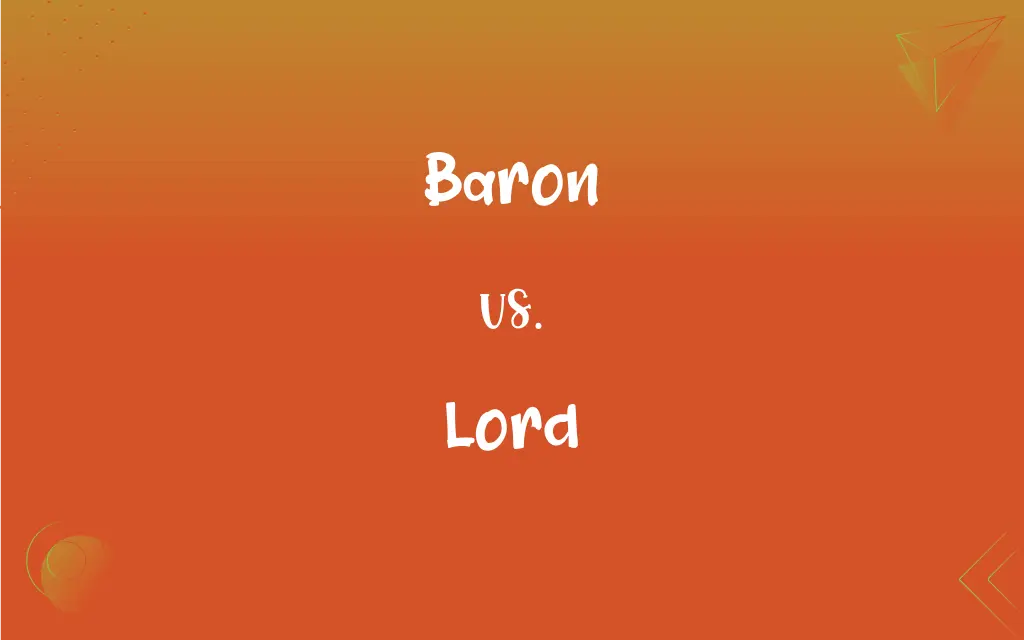Baron vs. Lord: What's the Difference?
Edited by Aimie Carlson || By Janet White || Published on May 18, 2024
Baron is a specific noble rank, while lord is a general title for male nobility or authority figures.

Key Differences
Barons and lords are integral components of the hierarchical structure of nobility, each with its distinct place and function. A baron is a specific title within the nobility, often seen as one of the lower ranks in the aristocratic hierarchy. On the other hand, "lord" is a more encompassing term that can apply to various ranks within the nobility, including barons, but also earls, dukes, and other titles. The term "lord" is used as a generic honorific for males in positions of authority or power, extending beyond the nobility to include individuals holding significant land or titles.
A baron is specifically tied to the land and the feudal duties associated with it, a lord might not have such direct ties, depending on the context and the specific title held. The responsibilities and privileges of a lord vary widely, encompassing a range of duties, rights, and social standings, from the management of vast estates to holding significant judicial or political power. The term "lord" can also denote a sense of general authority or leadership beyond the confines of the nobility.
The distinction between a baron and a lord lies not just in their respective positions within the nobility but also in the breadth of their application and significance. A baron has a very particular place within the nobility, with specific duties and rights, while the term "lord" can be applied more broadly, signifying various levels of power, authority, and social standing. This difference underscores the complexity and nuance of titles within the aristocratic system.
Both barons and lords play crucial roles in the fabric of historical and contemporary aristocratic societies, embodying the layered and multifaceted nature of nobility. The title of baron is a clear marker of noble status with defined responsibilities, whereas "lord" serves as a broader term that encapsulates the wider spectrum of noble and authoritative roles within society.
Comparison Chart
Specificity
Specific noble rank
General title for nobles
ADVERTISEMENT
Rank
Often the lowest rank of nobility
Can apply to any rank within nobility
Duties
Directly tied to land and feudal obligations
Varies widely, not always tied to specific duties
Usage
Primarily used in feudal contexts
Used in various contexts beyond feudalism
Historical Context
Originated as land-holding nobles
Used as a general term of respect for authority
Baron and Lord Definitions
Baron
"Title in various European countries."
The baron attended the king's council.
ADVERTISEMENT
Lord
"A man of high rank in a feudal society."
The lord of the manor was respected by all.
Baron
"Member of the lowest order of British nobility."
The baron's estate was known for its bountiful harvests.
Lord
"Title for various male nobles."
The lord was known for his generous contributions to the church.
Baron
"Feudal vassal holding lands under the king's patronage."
The baron mustered his knights for the upcoming campaign.
Lord
"Respectful term for a male in authority."
The lord mayor presided over the city's festivities.
Baron
"A nobleman of the lowest rank."
The baron ruled over his small fiefdom with fairness.
Lord
"Feudal superior or sovereign."
The lord granted lands to his most loyal knights.
Baron
"A person of great power in a specific area."
The baron of the industry revolutionized technology.
Lord
"A man of influence or authority."
The lord of the council had the final say in the matter.
Baron
A British nobleman of the lowest rank.
Lord
A king.
Baron
A nobleman of continental Europe, ranked differently in various countries.
Lord
A territorial magnate.
FAQs
What defines a baron?
A baron is the lowest rank of nobility, often tied to land and specific feudal duties.
How is the title of lord used today?
It's used as a general honorific for men in positions of authority or as part of specific noble titles.
Can a baron also be called a lord?
Yes, a baron can be referred to as a lord as part of the broader use of the term.
Is every lord a baron?
Not necessarily; "lord" can refer to various ranks within the nobility, not just barons.
How does one become a baron?
Traditionally, it was through royal grant or inheritance, though today it can also be through political appointment.
Can a woman hold these titles?
Women can hold equivalent titles: baroness for a baron and lady for a lord.
Can the title of baron be purchased?
In some historical contexts, titles could be bought, but it's not a common practice today.
What responsibilities did a historical baron have?
Barons managed lands, owed military service to their sovereign, and held judicial powers within their fiefdoms.
What's the role of a lord in local governance?
Historically, lords often had significant local governance roles, though this varies today.
What's the significance of a lord in Parliament?
Lords, particularly in the UK, can be members of the House of Lords, playing a role in the legislative process.
How does one address a letter to a lord?
Lords are typically addressed as "Lord [Surname]" in correspondence.
Are the titles hereditary?
Both baron and lord titles can be hereditary, passing from one generation to the next.
How are barons addressed?
Barons are typically addressed as "Lord [Surname]" or "Baron [Surname]."
What is a barony?
A barony is the land or estate granted to a baron.
Do barons still have feudal duties?
In most modern contexts, the feudal duties associated with being a baron have ceased.
Are there different types of barons?
Yes, there are several types, including barons by tenure, writ, patent, and life barons in the UK.
Can a lord be involved in business?
Yes, many lords have been successful businessmen, and the term "business lord" or "industrial baron" is sometimes used.
What's the historical importance of lords?
Lords have played key roles in governance, military, and society throughout history.
Do barons and lords have coats of arms?
Yes, it's common for barons and lords to have unique coats of arms symbolizing their family and status.
How do baronies and lordships impact modern society?
While their traditional roles have diminished, they often hold ceremonial, cultural, or political significance today.
About Author
Written by
Janet WhiteJanet White has been an esteemed writer and blogger for Difference Wiki. Holding a Master's degree in Science and Medical Journalism from the prestigious Boston University, she has consistently demonstrated her expertise and passion for her field. When she's not immersed in her work, Janet relishes her time exercising, delving into a good book, and cherishing moments with friends and family.
Edited by
Aimie CarlsonAimie Carlson, holding a master's degree in English literature, is a fervent English language enthusiast. She lends her writing talents to Difference Wiki, a prominent website that specializes in comparisons, offering readers insightful analyses that both captivate and inform.






































































